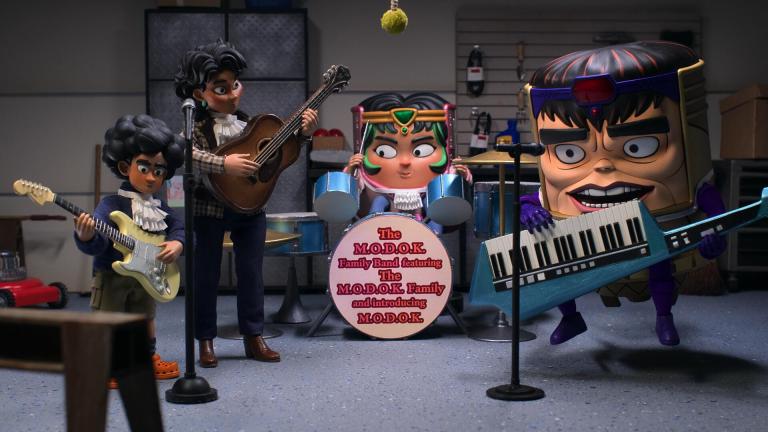Marvel’s M.O.D.O.K. Review: A Classic Animated Workplace Family Supervillain Sitcom
Hulu's comedic exploration of Marvel's classic villain mixes the suburban with the supervillainous.

This Marvel’s M.O.D.O.K. review contains no spoilers.
Marvel has already had a big year on the small screen through their Disney+ offerings WandaVision and The Falcon and The Winter Soldier, but on the heels of the latter’s finale comes a strange, quirky show to Hulu.
Marvel’s M.O.D.O.K. takes the humor of Deadpool, the weirdness of WandaVision, and a small dash of the animation style from Wallace & Gromit to create something…even stranger than it sounds. This adult animated series comes in part from the brains behind Robot Chicken, which does a lot to explain how those three things can be mashed together–to varying degrees of success.
The conceit behind the series is that M.O.D.O.K. (Mental Organism Designed Only for Killing), who has long been a part of the Marvel comics universe, has a family that lives in the suburbs. His company, A.I.M. (also from Marvel comic history) is failing—and so is his marriage. The first season sees the supervillain attempting to take back the reins of his destiny in order to secure a future better world that he creates (by slaughtering the Avengers and becoming a supreme ruler), but there are plenty of hurdles along the way. Sometimes it’s a matter of accidentally burning the arms off of henchmen (looking at you, Gary); occasionally it’s the Avengers (or second tier superheroes); and sometimes it’s just trying to set the right tone for his son’s bar mitzvah.
The character of M.O.D.O.K. has been around since 1967, created by Stan Lee & Jack Kirby in Tales of Suspense #93-94, and the big-headed genius inventor has always been over the top. Experimented on to become a superior being with a computer mind, the villain has a face larger than the rest of his body and floats around in a hover chair, his tiny limbs sticking out like pretzel sticks. While some stories in the Marvel-verse have managed to take M.O.D.O.K. seriously (Marvel’s Avengers videogame from 2020 is an excellent example), treating the already ridiculous design with humor works incredibly well, in part due to the excellent performance of Patton Oswalt, who is also one of the writers and showrunners.
No stranger to Marvel, Oswalt previously worked on Marvel’s Agents of S.H.I.E.L.D. as the Koenig family (performing the roles of various siblings, as well as their grandfather). He’s also one of the writers behind the M.O.D.O.K. comic series, M.O.D.O.K. Head Games, with fellow showrunner Jordan Blum, which features a less initially comedic version of M.O.D.O.K. having visions of his life as a family man—and who teams up with nemesis Iron Man to find a solution.
Oswalt is joined on the show not only by the executive producers of Robot Chicken (Seth Green, John Harvatine IV, Matthew Senreich, and Eric Towner), but a slew of voice actors viewers will be excited to recognize. M.O.D.O.K.’s wife, self-made self-help guru Jodie (whose own villainous tendencies frequently feature on the show), is hilariously voiced by Aimee Garcia of Lucifer. Daughter Melissa and son Lou (only one of whom inherited their father’s big head—Melissa floats around in a similar hover chair and is an expert in gaslighting, while Lou is seemingly happy with everything and has a talent for performance magic) are brought to life by Melissa Fulmero (Brooklyn Nine-Nine) and Ben Schwartz (Sonic the Hedgehog) respectively. Wendi McLendon-Covey’s Monica, a fellow super genius scientist and office rival, and corporate cog Austin, voiced by Beck Bennet, round out the regular cast. Stars like Nathan Fillion, Sam Richardson, Jon Hamm, and Whoopi Goldberg superbly lend their voices to supporting characters.
Cameos from Marvel’s best known characters (such as Iron Man) appear as often as expected, but the writers dug deep into the well of Marvel heroes and villains—so deep that viewers may decide to look up the cameos to find out if villains like Poundcakes and Melter actually appeared in the comics. (They did.) As the plot builds, it becomes clear that there are additional threats to M.O.D.O.K.’s existence—including one villain that may make viewers wonder if M.O.D.O.K. will end up a hero instead of an anti-hero. As it turns out, such threads are left open at the end, and viewers will have to wait to see if M.O.D.O.K. saves (or conquers, or destroys) the world in season 2.
M.O.D.O.K.’s world involves the same kind of watercooler humor viewers might expect from a show about running a business (or a slice of life show that centers on a family), but with supervillains as the main characters, there’s no moral center to be found. This is a feature it gleefully explores, glorying in guts and blood and body count, while also completely ignoring any sort of ethical question that might come into play.
It’s as cynical and gross as the Deadpool films without even that franchise’s moral compass…which is saying something. (In contrast, when the villains comment on ethical issues, such as women using their sensuality to get what they want, or conglomerates using a creative’s race to further promote their work, it puts such issues into truly stark display.) But the shock value and gross-out humor work inside the constraints of the show, and viewers who love this type of outrageous mischief will enjoy watching all of M.O.D.O.K.’s hijinks without ever being quite certain whether to root for him—or hope that someone eventually serves his just desserts.
Marvel’s M.O.D.O.K. premieres all 10 episodes Friday, May 21 on Hulu.
